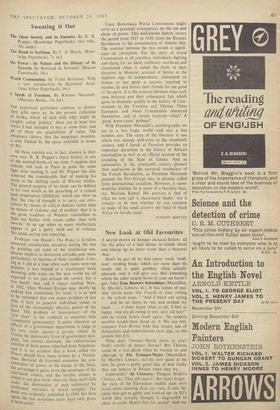Sweating it Out
The Open Society and its Enemies. By K. R. Popper. (Routledge Paperbacks, two vols., 10s. each.) On Power : Its Nature and the History of its Growth. By Bertrand de Jouvenel. (Beacon Paperbacks, 18s.) World Communism. By Franz Borkenau. With a new introduction by Raymond Aron. (Ann Arbor Paperbacks, 16s.) I Speak of Freedom. By Kwame Nkrumah. (Mercury Books, 12s. 6d.)
THE paperback publishers continue to shower their gifts upon us. In the present collection of books, which all deal with what might be roughly called 'politics,' there are at least two which 1 had intended to buy at some time, and all of them are acquisitions of value. The imaginary library, like the imaginary museum, is only limited by the space available in house or fiat.
All these reprints are, in fact, classics in their own way. K. R. Popper's Open Society is one of the seminal books of our time; I suppose that nobody will look at Plato in quite the same light after reading it, and Dr. Popper has also achieved the considerable feat of making his mark in the shifting sands of Marxist studies. The general purpose of his book can be defined in his own words as the preaching of 'a critical (and progressive) fallibilism' which can show us that 'the role of thought is to carry out revo- lutions by means of critical debates rather than by means of violence and of warfare; that it is the great tradition of Western rationalism to fight our battles with words rather than, with swords.' In an age when so many intellectuals appear to get a guilty thrill out of violence this needs saying and repeating.
Professor von Hayek's The Road to Serfdom attracted considerable attention during the war by pointing out some of the totalitarian ten- dencies implicit in historicist attitudes and, more particularly, in theories of State socialism. Com- ing as it did at a time when such views were not Popular, it was treated as a reactionary work throwing cold water on the 'new world we all expected to see just around the corner, but it was hardly that, and it repays reading. Now, in 1962, when Western Europe may shortly be seeking new institutions for itself, it is as well to be reminded that one major problem of our time is how to preserve individual values in face of the increasingly effective power of the tate. The problem of bureaucracy—of the `new class'—is not confined to countries with
Communist governments. It exists wherever an
official, or a government department is judge in
his own cause against a private citizen. In France the democratic form of government miti- gates, but cannot eliminate, the authoritarian exercise of State power inherited from Napoleon, and it is no accident that a book called On Power should have been written by a French- man. Bertrand de Jouvenel examines the con- centration of power in the hands of the State,
the advantage it gains from the weariness of the individual citizen, and the terrible abuses to which it can give birth when the State itself falls traditional the domination of men unfettered by r"itional restraints or moral scruples. The book was originally published in 1945. but here 'gain the last seventeen years have only given it more point. Franz Borkenau's World Communism might serve as a practical commentary on the use and abuse of power. This well-known history covers the period from 1917 to 1938, from the Russian Revolution to the assassination of Andres Nin. The contrast between the two events is signifi- cant—of corruption. For the story of world Communism is of countless individuals fighting and dying for an ideal, ruthlessly sacrificed and abandoned when it suited the book of their directors in Moscow, accused of heresy at the slightest sign of independence, eliminated on failure or too great a success, required to murder, lie and betray their friends for the good of the party. It is the contrast between what such men believed and their subsequent fate which gives its dramatic quality to the history of Com- munism in the Twenties and Thirties. These European and Asian Communists destroyed themselves, and in return received—what? A `good, brave cause' perhaps?
With President Nkrumah's 'autobiography we are in a less tragic world—and also a less modern one. The story of the liberator is one which was already well-worn in the nineteenth century, and 1 Speak of Freedom provides an important document in the history of African nationalism as well as an official account of the founding of the State of Ghana. And as nationalists in the nineteenth century dressed their aspirations in the universal vocabulary of the French Revolution, so President Nkrumah presents his Pan-African idea in phrases culled from international socialism. However, it seems doubtful whether he is more of a Socialist than, say, Mustafa Kemal. His position is that of what we now call 'a charismatic leader,' but it remains to be seen whether he can continue to make of his small country the head of black Africa on baraka alone.
ANTHONY HARTLEY














































 Previous page
Previous page